Residential construction - Geywitz visits factory for "climate-positive concrete" in Soltau
Federal Minister Klara Geywitz visited a factory of Bton Fertigteil GmbH in Soltau to gain an impression of sustainable construction. "It's encouraging to see how inventiveness and engagement here create solutions that, on the one hand, accelerate the process through the production of entire walls and, on the other hand, also make a contribution to the decarbonization of the construction industry," said the SPD politician.
During the factory tour, she was shown how the new procedure is used to manufacture lighter building components by using less steel. "This is a contribution to more tempo in residential construction," emphasized Geywitz. By the end of 2025, it is planned to produce so much in this plant in the Heidekreis that up to 5,000 apartments could be built annually. "The more concrete is produced, the less greenhouse gas is in circulation," explained Thomas Sievers, co-founder of Bton.
According to company statements, concrete building components such as facades, wall and roof elements for residential construction are produced in a patented hybrid mixing technology according to DIN norm, which reduces CO2 emissions and simultaneously uses carbon-reducing materials.
This enables the production of concrete types that bind more CO2 than they release, and reduces the dependence on steel. The "climate-positive concrete" is lighter, more ecological, cost-effective, and offers improved thermal insulation, it was further stated.
- Klara Geywitz, the SPD politician responsible for housing policy in Lower Saxony, expressed her support for sustainable residential construction during her visit to Bton Fertigteil GmbH's factory in Soltau.
- Geywitz commended the factory's use of sustainable practices, such as producing entire walls and contributing to decarbonization in the construction industry.
- The Factory in Heidekreis, Germany, plans to produce enough concrete to build up to 5,000 apartments annually by 2025, reducing greenhouse gas emissions in the process.
- Thomas Sievers, co-founder of Bton, explained that the company's patented hybrid mixing technology reduces CO2 emissions and reliance on steel while producing "climate-positive concrete."
- This climate-positive concrete is lighter, more ecological, cost-effective, and offers improved thermal insulation, making it beneficial for both the environment and the construction industry in Germany.
- Klara Geywitz emphasized that this innovation in residential construction is vital for Germany's commitment to lowering emissions and promoting energy-efficient housing as part of its climate change strategy.








